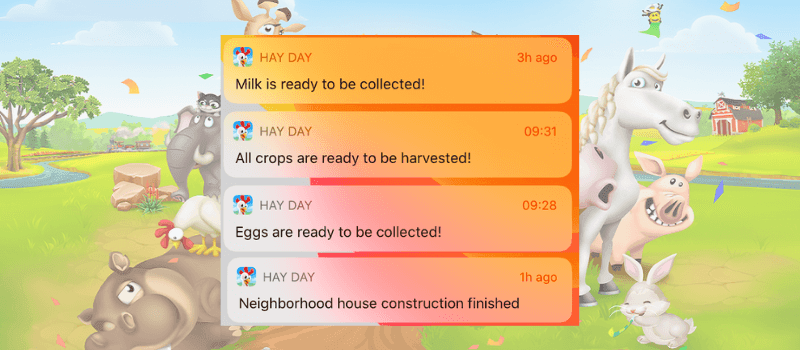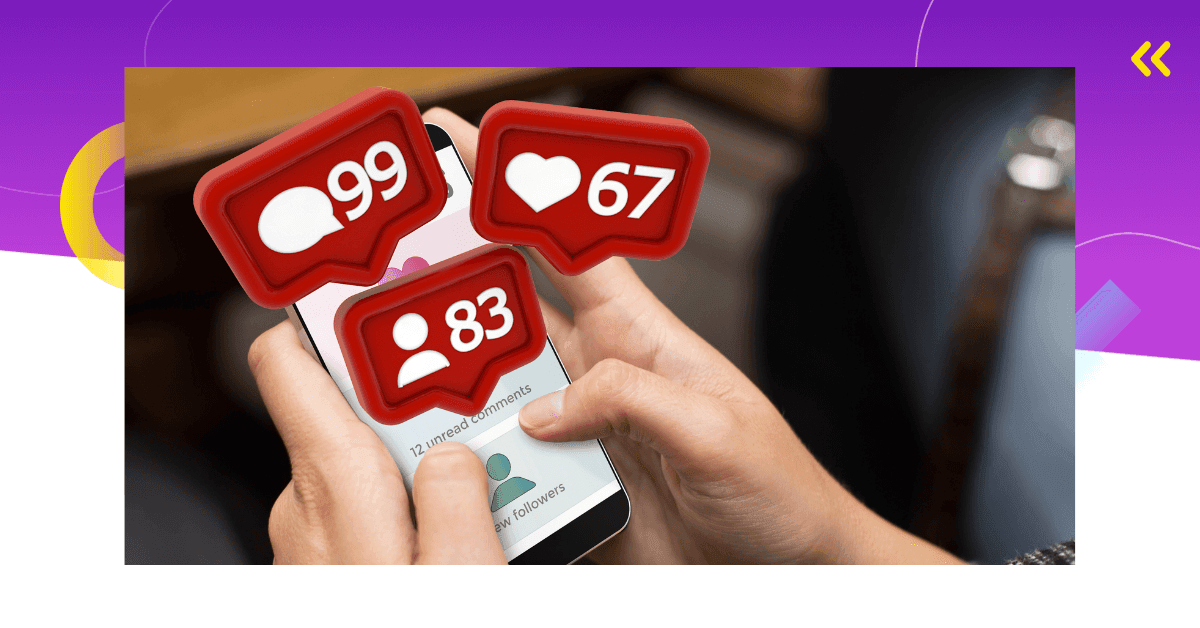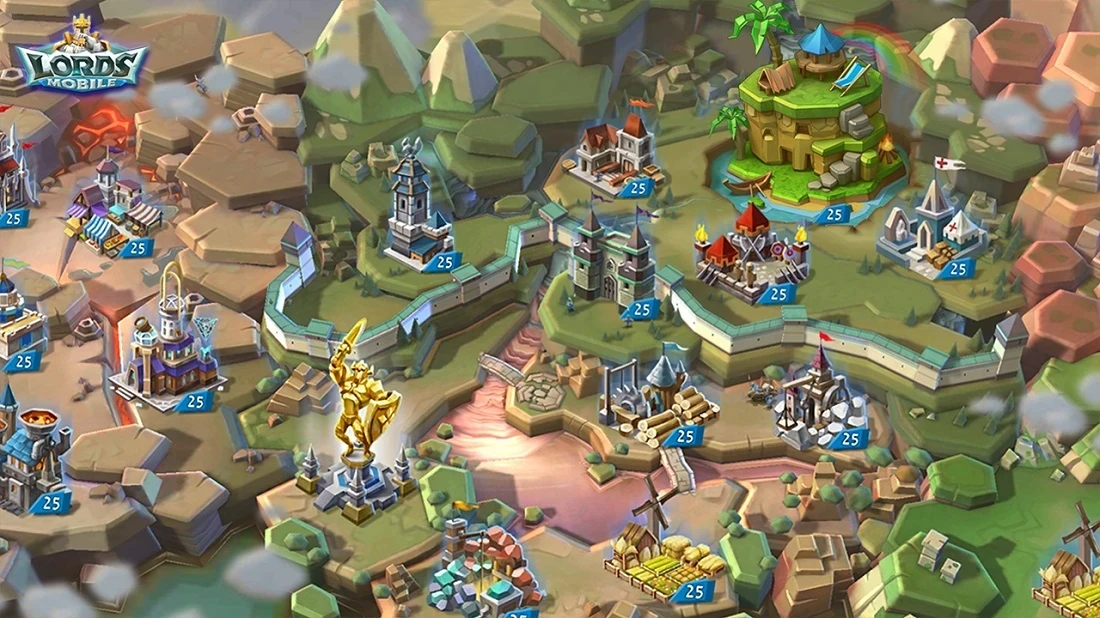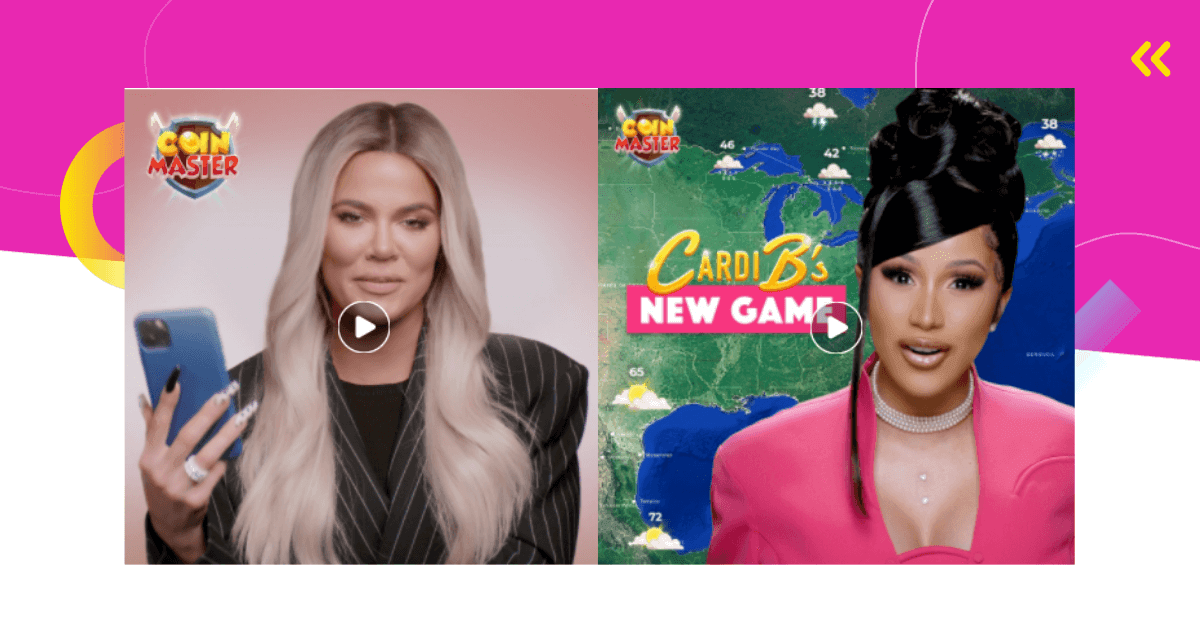Push notifications can be an amazing tool for user retention and engagement.
But sometimes, they are just utterly annoying.
There is a fine line between the two.
Best practices suggest that push notifications should be relevant, timely, and valuable.
The problem?
This is much easier said than done.
Even some of the world’s top-grossing games don’t have well-made push notification strategies. On the other hand, a lot of them know exactly what they are doing.
In this article, I’m bringing you over 50 push notification examples from mobile games. I will analyze their relevance, content, and frequency.
Let’s begin!

Choices: Stories You Play
This interactive story game doesn’t send out a lot of push notifications to its players.
However, when it does, it is for all the right reasons.
The first reason why Choices players receive notifications is a timer countdown. The thing is, if they actively play the game, they will run out of keys. This restricts their session and starts a wait timer.
Once the timer does its thing, players receive a simple “You’ve got keys” notification. This is a signal that they can continue their session.
The other reason the game sends out push notifications is sudden inactivity.
It features a “Your prince is waiting for you” copy. This is a good copy because it aligns with the story the players are playing.
Now, the not so good.
The game sends out notifications with identical content. For this reason, they can feel generic and dull.
Another issue is that both notifications contain the same CTA – “Come back to Choices.” It’s good that the game uses a CTA (many games don’t), but it wouldn’t hurt to mix it up a bit.
Content: ⭐️⭐️⭐️
Relevancy: ⭐️⭐️⭐️⭐️⭐️
Frequency: ⭐️⭐️⭐️⭐️

CSR Racing 2
Within one hour of installing this game and playing it for five minutes, I received three push notifications.
Needless to say – this is BAD.
Even if players like the game and want to continue playing it, this feels incredibly spammy and annoying.
On a more positive note, the content of the notifications is actually pretty good.
The first welcome notification is written in a casual tone and it brings just the right amount of emojis.
The notification that says, “Don’t let your crew down,” is another good example. It makes players feel like an important part of the team. Plus, it conveys a sense of urgency, which is always a good idea.
Yet, all of this was ruined by an “It’s time to race” notification that came just five minutes later.
While this might work for them, it’s hard to believe.
If these three notifications were spread out throughout the day, this wouldn’t be so bad. It would also be acceptable if I played the game multiple times that same day. This was not the case, so this game really needs to do something about its notification frequency.
Later on, the game continued sending out different notifications. Their content was good and fairly relevant for players. The “Your first car is on the house” notification is a great example.
However, the notifications were so frequent that they made me uninstall the game. And I’m sure a lot of players had the same experience.
Content: ⭐️⭐️⭐️⭐️
Relevancy: ⭐️⭐️⭐️
Frequency: ⭐️

June’s Journey
In June’s Journey, the players’ sessions are limited by wait timers. Once the countdown is over, they can get back to playing the game.
For this reason, the game informs players when timers have done their job. This is relevant for all players, especially for non-payers. Some of these players are impatiently waiting to come back to the game.
The other reason the game sends out notifications is just to remind players to come back to the game.
The content of all of these push notifications is well-written. They address players with “you”, they are written in a conversational tone and contain emojis. With this style, they could easily fit into social media feeds.
On the flip side, sometimes they are identical. This isn’t good because the notifications have pretty memorable content. Hence, when players receive more of the same, they won’t pay as much attention to them as they used to.
When it comes to push notification frequency, June’s Journey hits the right spot.
The more active players are – the more notifications they will receive. If they play the game once a day, they should get one or two notifications. If they play more, they will get more.
All in all, this game provided us with some of the best push notification examples.
Content: ⭐️⭐️⭐⭐
Relevancy: ⭐️⭐️⭐️⭐️⭐
Frequency: ⭐️⭐⭐⭐⭐

Call of Duty: Mobile
Mid-core games like Call of Duty: Mobile also send out push notifications. However, they do it less frequently than the games in the casual category.
For example, I played this game for seven days and only received three push notifications. They started appearing after I had been playing the game for five days already. In other words, they are intended for engaged players.
This is done for a reason.
All these push notifications promoted different in-app purchase offers. And as we all know, engaged players are most likely to make in-app purchases.
What about their content?
The notifications do a decent job describing what players can get out of each purchase. For example, “destruction” or “more than just community service”.
Moreover, phrases like “Don’t miss out” or “Act before it’s too late” create a sense of urgency. When it comes to in-app purchases, creating urgency is always welcome.
The problem with these notifications is that they come with quite complicated offer descriptions. Sometimes, simplicity is a better option.
Moreover, sending out IAP push notifications is generally a risky move. Some players will inevitably perceive them as an aggressive monetization strategy.
Content: ⭐️⭐️⭐
Relevancy: ⭐️⭐️⭐️
Frequency: ⭐️⭐⭐⭐⭐

State of Survival
This strategy/RPG game also utilizes the power of push notifications.
Here’s how exactly.
In most cases, players receive notifications about stamina crates they can collect on an eight-hour basis. This certainly provides players with a valid reason to come back to the game.
It’s also good that the notifications contain a “Grab them quick” CTA which brings urgency to the table.
However, not everything is done so well.
First of all, the notifications are sent literally every eight hours. It’s not even the frequency that’s the problem here. The thing is, players can receive notifications even in the middle of the night. For example, I have been regularly getting one at 2:00 AM.
The other problem is that the notification content was repeatedly the same. When players receive notifications like these, they may develop a habit of ignoring them.
The game also sends out notifications when players are inactive.
Players receive a basic “Your Settlement needs you!” notification. This notification is missing a CTA, as well as some creativity. These notifications are also always identical, so that’s another negative.
All in all, this game’s push notification strategy has a lot of room for improvement.
Content: ⭐️⭐️⭐️
Relevancy: ⭐️⭐️⭐️⭐️
Frequency: ⭐️⭐

Hay Day
This farming game has wait timers all over the place. For example, players need to wait before harvesting their crops, collecting their eggs, milk, etc.
This means the players’ sessions are limited (unless they pay). If they want to continue playing, their only option is to wait until these actions are completed. For this reason, Hay Day notifies players when timer countdowns are over.
From a player’s perspective, these notifications are useful and relevant. They help them to progress quicker and help them organize their playing schedules.
The notification content is short, simple, and informative, which is good.
On the other hand, there is room for improvement.
The notification content is written in a passive tone of voice. It would be better if the game used active voice because it is more persuasive.
For example, instead of the notification, “Eggs are ready to be collected,” it could say, “Your eggs are ready. Collect them now!”
These notifications are sent frequently only if players actively play the game. If there are no crops to harvest or eggs to collect, the game won’t bother inactive players.
Content: ⭐️⭐️⭐⭐
Relevancy: ⭐️⭐️⭐️⭐️⭐️
Frequency: ⭐️⭐⭐⭐⭐

Wordscapes
Just like its name suggests, players play this game for its exciting word puzzles and a chance to escape the real world.
However, sometimes they need a little push to come back to the game. This is where push notifications come in.
The first notification speaks directly to the user by saying, “You are lucky.” It also gives them a good reason to come back to the game – a daily gift.
The other notification uses the same motive to bring players back to the game. I guess Wordscapes players love their daily gifts.
Daily rewards are a powerful retention tool even without push notifications. Combined with them, they can lure even more players back to the game.
See how the notifications are about the same thing?
Yet, they don’t have the same content. This is a major plus. Moreover, the content is good and to the point.
Another push notification I received from Wordscapes was a helpful hint. After being stuck on a level, the game recognized it and sent me a word to try out. This shows the game tracks the players’ progress and feels very personal.
Wordscapes definitely doesn’t overwhelm players with push notifications. Even if they play the game daily, the game doesn’t reach out to them every single day.
Sure, the game segments players in different ways.
However, from my point of view, the notifications could be more frequent without negatively affecting retention. The game is not even close to the point where it annoys players with notifications.
Content: ⭐️⭐⭐️⭐️⭐️
Relevancy: ⭐️⭐️⭐️⭐️⭐️
Frequency: ⭐️⭐⭐️⭐️

Clockmaker
In this match-3 game, players can stumble upon three types of push notifications:
- Daily gift notifications
- Event notifications
- Lives notifications
Some players crave gifts or more lives, while others are more interested in events. Hence, these different notifications are relevant for different groups of players.
Clockmaker sends out notifications moderately. For example, I received one to three notifications per day, and I played the game every day. From an active player’s perspective, this feels like the right amount of notifications.
The notifications contain appropriate emojis, which makes them feel casual, like the game itself is.
Not everything is great, though.
Sometimes, players receive notifications with the same content. Moreover, none of the notifications include a direct invite for the player to come back to the game – a call to action.
Content: ⭐️⭐️⭐
Relevancy: ⭐️⭐️⭐️⭐️⭐️
Frequency: ⭐️⭐⭐⭐⭐

Candy Crush Saga
Candy Crush Saga has been on the market for almost a decade now. It seems that during this time, it mastered the craft of push notifications.
Just look at the first push notification in the image above. This is my favorite out of all push notification examples in this article. It uses emojis that simulate match-3 tiles.
So simple, yet so genius.
Plus, it leverages one of the main motivations to play the game in the first place – relaxation.
The other notification invites players to come back to the game in a similar manner. Only this time, it mentions “fun” as the motivation to play the game.
Another reason the game sends out notifications is in-game lives. Every player can have a maximum of five lives. Every time they lose on the match-3 board, they lose a life, which takes 30 minutes to restore.
With no lives, players can’t play on the board. For this reason, a lot of players are waiting for a notification to tell them they can get back to playing.
Another good thing about the game’s strategy is that it doesn’t go overboard with push notifications. Active players receive one or two notifications per day.
Content: ⭐️⭐️⭐⭐⭐
Relevancy: ⭐️⭐️⭐️⭐️⭐️
Frequency: ⭐️⭐⭐️⭐️⭐️

This slots game sends out a large number of push notifications to its players.
It notifies players about different things, such as in-game event updates, free coins, and other free rewards.
All of these are good reasons for players to return to the game.
This game brings some interesting push notification examples. They appear as text notifications, as well as image banners. Image banners aren’t something we commonly see in mobile game push notifications. For this reason, they have an even better chance of catching the players’ attention.
The notification content is pretty good – it’s always diverse, fun, and timely.
For example, players get good morning and good night messages about the same thing – free coins. These messages appear at the appropriate time (not in the middle of the night), which is very important.
From my point of view, the biggest problem with Cash Frenzy push notifications is their frequency.
Players often get five or more push notifications a day. Even inactive players receive several notifications daily.
Sure, if it works for them, great. But from a player’s perspective, this feels like a lot.
Content: ⭐️⭐️⭐⭐⭐
Relevancy: ⭐️⭐️⭐️⭐️⭐️
Frequency: ⭐️⭐

8 Ball Pool
8 Ball Pool is a competitive multiplayer sports game.
Therefore, it comes as no surprise that its push notification strategy is mainly set around competing.
The notification about “the next opponent” targets competitive players. The words “ready” and “impatient” additionally boost the sense of competition.
Another similar example is the notification about “new challengers”.
Both of these notifications urge players to play the game, and they end with strong CTAs.
Moreover, the game also notifies players if someone adds them as friends. This is a big deal for players who enjoy the social aspect of the game.
Players also receive notifications about new daily missions. This is important for players looking to earn extra rewards.
All of these are relevant reasons to send out push notifications. Even better, they leverage different motivations for logging into the game.
When it comes to their frequency, it’s just right. The number of notifications per day depends on how actively players play the game.
Content: ⭐️⭐️⭐⭐⭐
Relevancy: ⭐️⭐️⭐️⭐️⭐️
Frequency: ⭐️⭐⭐️⭐️⭐️

Homescapes
In Homescapes, push notifications are related to two things: in-game lives and in-game events.
Both of these are relevant for players.
As you can see in the push notification examples above, some notifications carry a sense of urgency.
For example, “Finish the cake before the event is over” or “Unlimited lives are going to expire.” Even though they refer to completely different things, the sense of urgency makes players more likely to engage with them.
Push notifications also put focus on the rewards players can win by participating. This is another great motivator for players to relaunch the game. Especially if they are tight with resources.
It’s also good that all notifications include CTAs and use emojis moderately.
Furthermore, the game carefully tracks the number of times players play per day. Based on that, they receive more or less push notifications.
Overall, this game brought us great push notification examples. Its strategy is well done and doesn’t feel pushy. Good job, Playrix!
Content: ⭐️⭐️⭐⭐⭐
Relevancy: ⭐️⭐️⭐️⭐️⭐️
Frequency: ⭐️⭐⭐️⭐️⭐️

Panda Pop
In this bubble shooter game, the players’ main task is to rescue baby pandas.
The first push notification players receive from the game is a welcome notification. It mentions, of course – saving baby pandas.
One of the reasons for this is causing an emotional reaction in players. I mean, who could possibly resist saving poor baby pandas?
Moreover, it uses the power word “now”, which additionally boosts the players’ responses to the notification.
If players don’t complete Panda Pop levels on the first attempt, they lose lives. If they lose all five of them, they have to wait until they are restored. For this reason, the game notifies players when they get all their lives back. This is something active players surely want to know.
Also, the notification about restored lives contains the phrase, “Pop til you drop.” This is good because it makes the notification amusing and informal.
Furthermore, as players progress through the game, the game sends out appropriate messages. For example, when players unlock a new feature like Zen Garden, they will start getting notifications about it.
The notifications aren’t too frequent, as even daily active players don’t receive them every day.
Content: ⭐️⭐️⭐⭐
Relevancy: ⭐️⭐️⭐️⭐️⭐️
Frequency: ⭐️⭐⭐️⭐️⭐️

Lords Mobile
The Lords Mobile push notification strategy is set around three things:
- resources
- social features (guilds)
- real-time events
The most common type of notifications players receive are guild notifications. For example, players are notified every time they receive guild gifts. Or if their guildmates start live actions against enemies.
These notifications are most relevant for players who enjoy social interaction. Moreover, they encourage players to participate in guild efforts.
Real-time event notifications and resource notifications are also important for players. After all, different players care about different things.
Their content? Not so good.
Most of these push notifications seem pretty generic and impersonal. Players often receive the same notifications, and none of them contain CTAs or a sense of urgency.
For example, the notification about the War of Wonders that starts in ten minutes could create a much stronger sense of urgency. This could be done by using phrases like “Hurry up” or “Join now.”
Finally, the notification frequency is well set. The longer and more actively the players play the game, the more notifications they start receiving.
Content: ⭐️⭐️
Relevancy: ⭐️⭐️⭐️⭐️⭐️
Frequency: ⭐️⭐⭐️⭐️⭐️

Tangle Master 3D
Here are some push notification examples from Tangle Master 3D.
Tangle Master 3D is a hyper-casual game that brings players challenging tangles and knots they need to master.
The game sends out several push notifications per day. Hyper-casual games usually send out more notifications than other types of games. Therefore, this is not too much.
As you can see, most notifications Tangle Master sends out are bolded.
This makes them stand out more than the usual ones. However, this also means they take up more space. Hence, if they are too long, players can’t see the whole notification, like in the first example above.
The second notification looks much better. It is written in the first person, which is a great copywriting trick.
Written like this, the notification feels like a personal note from the person behind the game, i.e., the publisher. Not just another message from another company.
Next, the “Only 10% can complete this level” notification is a typical copy used by many mind-teasing games. Its point is to challenge the players, and it serves its purpose.
Finally, as you can see, some notifications by Tangle Master are simply “p l a y f u l”. Since they look so special, they are definitely difficult to ignore.
Content: ⭐️⭐️⭐⭐
Relevancy: ⭐️⭐️⭐️⭐️
Frequency: ⭐️⭐⭐⭐⭐

Coin Master
In Coin Master, players spend their time either raiding other players’ villages or using a slot machine.
The sheer nature of the game makes most Coin Master players highly competitive.
This is a great reason for the game to send out notifications every time someone attacks the player’s village.
In these notifications, players can see the name of the player who attacked them. This is great because it makes the messages feel more personal. Also, it ends with an appropriate CTA – “Revenge now.”
The game also notifies players when their spins are refilled. This means they can get back to the slot machine.
Moreover, Coin Master often rewards players with free coins or spins. This is a powerful retention technique but also a great reason to send out push notifications.
The game also tracks the players’ journeys and sends out notifications accordingly.
This means that after playing the game for a while, players start receiving IAP notifications. For example, the “New Year Special Pack” notification in the image above.
Players receive a lot of push notifications from the game, whether they are actively playing it or not. While active players probably won’t mind them, currently inactive players may find them slightly annoying. All things considered, Coin Master delivered great push notification examples.
Content: ⭐️⭐️⭐️⭐️⭐️
Relevancy: ⭐️⭐️⭐️⭐️
Frequency: ⭐️⭐⭐️

Clash of Clans
Finally, here are some push notification examples from Clash of Clans.
Just like most strategy games, Clash of Clans heavily relies on wait timers. They limit the players’ sessions and fuel the game’s revenues.
For this reason, it comes as no surprise that the wait timers are at the heart of the game’s push notification strategy.
When players play the game, they start different actions. For example, upgrading a building or troop training. Once they go offline, the countdowns continue.
Once the countdowns are complete, the game lets players know about it.
The content of these notifications is basic and repetitive. No, Clash of Clans definitely doesn’t deserve a push notification copywriting reward.
However, this is not a complete disaster either.
The thing is, these types of notifications don’t need to be utterly exciting. They should be to the point and tell players something they are interested in. And Clash of Clans notifications have both of these characteristics.
The game sends out a lot of such notifications, but only to active players. While this is not too bad, sometimes players receive many notifications at the same time, which can look spammy.
On the other hand, when they are not actively playing, players might receive occasional notifications. For example, if their village is raided by someone or a simple “Come back” notification.
Content: ⭐️⭐️
Relevancy: ⭐️⭐️⭐️⭐️
Frequency: ⭐️⭐⭐️
Final Thoughts on Push Notification Examples
Here’s what we’ve learned from analyzing these push notification examples from popular mobile games.
- Always ask permission before sending out push notifications
- Don’t bombard users with notifications as soon as they install the game
- Be strategic about notification frequency
- Avoid repetitive content
- Make sure the message content is relevant to the game
- Provide value to users
- Offer rewards
- Work on your call to action
- Create a sense of urgency
- Personalize all messages
Achieving all of that can be tough – there’s so much to think about.
For that reason, developers often use push notification services that make it easier to send the right message at the right time. Furthermore, they allow you to automate messages, which is a time saver.
The top five for us are OneSignal, LeanPlum, Moengage, Airship, and Kumulos. For a detailed analysis of more than ten push notification providers, check our article.
Hopefully, this article helped you get a better understanding of what makes push notifications good and less good.
What are your thoughts on these push notification examples for mobile games? Leave us a comment below!







Comments